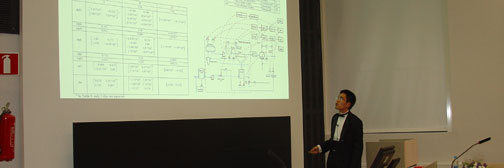| | Year 2011
Hermanus Stefanus BosmanTwo-phase MPC
Modern day industrial processes are becoming ever more complex and require a method that is computationally efficient and controls the process adequately. Model Predictive Control is one such strategy that has been proven to be efficient and has been utilized in industry for the last thirty years. The benefit of utilizing MPC originates from the ability to handle constraints, tolerate delays, and compensate for strong interaction in the process. This however, requires an accurate model of the process. In the absence of an accurate model the trend is towards nonlinear and robust predictive control techniques however, these have a high computational burden.
This thesis aims to develop a model for a reduced Tennessee Eastman Challenge problem and thereafter, to utilize the created model for the formulation of a two-phase model predictive controller.
In the literature part, a survey of some of the existing techniques is carried out and the techniques utilized are explored briefly.
In the experimental part a model is made of the Tennessee Eastman process, constraints for the control of this process with the MPC technique are defined, and finally both a standard constrained MPC and the two-phase MPC are used to simulate the control of this process.
Finally, the performance of the two-phase MPC with a shorter control horizon is compared with the performance of both a standard soft-constrained MPC with a long and short control horizon. The similar performance of the short control horizon two-phase MPC with that of the longer control horizon standard soft-constrained MPC is confirmed and presented.
This info last modified 27 Apr 2024 by Jerri Kämpe-Hellenius
|

